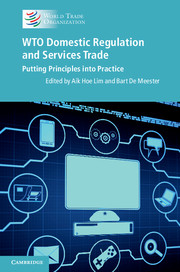Book contents
- Frontmatter
- Contents
- List of contributors
- Foreword
- Disclaimer
- Acknowledgements
- List of abbreviations
- 1 An introduction to domestic regulation and GATS
- Part I Impediments to services trade, regulatory theory and principles
- Part II Legal perspectives on WTO principles and domestic regulations
- 4 Reasonableness, impartiality and objectivity
- 5 Balancing legal certainty with regulatory flexibility
- 6 Who’s afraid of necessity? And why it matters?
- 7 Mutual recognition of services regulation at the WTO
- Part III Case studies
- Part IV Concluding remarks
- Index
- References
7 - Mutual recognition of services regulation at the WTO
Published online by Cambridge University Press: 05 April 2014
- Frontmatter
- Contents
- List of contributors
- Foreword
- Disclaimer
- Acknowledgements
- List of abbreviations
- 1 An introduction to domestic regulation and GATS
- Part I Impediments to services trade, regulatory theory and principles
- Part II Legal perspectives on WTO principles and domestic regulations
- 4 Reasonableness, impartiality and objectivity
- 5 Balancing legal certainty with regulatory flexibility
- 6 Who’s afraid of necessity? And why it matters?
- 7 Mutual recognition of services regulation at the WTO
- Part III Case studies
- Part IV Concluding remarks
- Index
- References
Summary
Introduction
Mutual recognition is a useful tool for international liberalization in particular contexts. However, it has two types of limit, and to the extent that it may exceed these limits, it poses two important types of risk.
The first limit of mutual recognition is set by the degree and importance of achievement of the relevant regulatory goal: the degree to which the foreign regulation achieves the goals of the domestic regulatory scheme, and the importance of meeting these goals. Thus, the first risk is that mutual recognition is implemented in a way that sacrifices important regulatory goals without adequate justification – without ‘sufficient’ achievement of the regulatory goal. States may, at times, accept compromises of their regulatory goals, but they should not do so unless they are compensated with enhanced welfare from free trade or from other sources. The second limit of mutual recognition relates to the material capacities of developing countries. The risk is that mutual recognition is established by developed countries in a way that disadvantages services exports of developing countries.
- Type
- Chapter
- Information
- WTO Domestic Regulation and Services TradePutting Principles into Practice, pp. 110 - 126Publisher: Cambridge University PressPrint publication year: 2014
References
- 1
- Cited by



